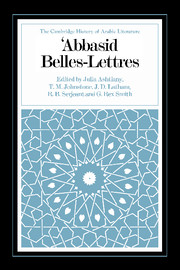Book contents
- Frontmatter
- The ʿAbbasid Caliphate: a historical introduction
- 1 Adab and the concept of belles-lettres
- 2 Shuʿūbiyyah in Arabic literature
- 3 Ibn al-Muqaffaʿ and early ʿAbbasid prose
- 4 Al-Jāḥiẓ
- 5 Al-Ṣaḥib Ibn ʿAbbād
- 6 Abū Ḥayyān al-Tawḥīdī
- 7 Al-Hamadhānī, al-Ḥarīrī and the maqāmāt genre
- 8 Fables and legends
- 9 ʿAbbasid poetry and its antecedents
- 10 Hunting poetry (ṭardiyjāt)
- 11 Political poetry
- 12 Love poetry (ghazal)
- 13 Wine poetry (khamriyyāt)
- 14 Mystical poetry
- 15 Ascetic poetry (zuhdiyyāt)
- 16 Bashshār b. Burd, Abū ʾl-ʿAtāhiyah and Abū Nuwās
- 17 Al-Mutanabbī
- 18 Abū Firās al-Ḥamdānī
- 19 Abū ʾl-ʿAlāʾ al-Maʿarrī
- 20 Literary criticism
- 21 Ibn al-Muʿtazz and Kitāb al-Badīʿ
- 22 Regional literature: Egypt
- 23 Regional literature: the Yemen
- Appendix: Table of metres
- Bibliography
- Index
6 - Abū Ḥayyān al-Tawḥīdī
Published online by Cambridge University Press: 28 May 2012
- Frontmatter
- The ʿAbbasid Caliphate: a historical introduction
- 1 Adab and the concept of belles-lettres
- 2 Shuʿūbiyyah in Arabic literature
- 3 Ibn al-Muqaffaʿ and early ʿAbbasid prose
- 4 Al-Jāḥiẓ
- 5 Al-Ṣaḥib Ibn ʿAbbād
- 6 Abū Ḥayyān al-Tawḥīdī
- 7 Al-Hamadhānī, al-Ḥarīrī and the maqāmāt genre
- 8 Fables and legends
- 9 ʿAbbasid poetry and its antecedents
- 10 Hunting poetry (ṭardiyjāt)
- 11 Political poetry
- 12 Love poetry (ghazal)
- 13 Wine poetry (khamriyyāt)
- 14 Mystical poetry
- 15 Ascetic poetry (zuhdiyyāt)
- 16 Bashshār b. Burd, Abū ʾl-ʿAtāhiyah and Abū Nuwās
- 17 Al-Mutanabbī
- 18 Abū Firās al-Ḥamdānī
- 19 Abū ʾl-ʿAlāʾ al-Maʿarrī
- 20 Literary criticism
- 21 Ibn al-Muʿtazz and Kitāb al-Badīʿ
- 22 Regional literature: Egypt
- 23 Regional literature: the Yemen
- Appendix: Table of metres
- Bibliography
- Index
Summary
CONTEMPORARY PERSPECTIVES
Abū Ḥayyān ʿAlī b. Muḥammad b. ʿal-cAbbās al-Tawḥīdī was born, in either Iraq or Fārs, between 310–20/922–32; he died in Shiraz in 414/1023. His life was spent under Shīʿī Buwayhid rule, and on several occasions he served the Buwayhids, though himself a Sunnī; but, although his beliefs were not those of the Shīʿī ruling classes, neither were they always congenial to his fellow Sunnīs. Consequently, though he now holds an acknowledged place in Arabic literature, he underwent a long period of neglect. Besides their literary merit, his writings are of considerable historical interest, and new editions of his works, together with manuscripts discovered over the past thirty years, provide valuable material for the detailed study of social and intellectual developments in the fourth/tenth century.
Medieval sources and modern studies alike (the latter beginning in 1883 with Aḥmad Fāris Shidyāq, one of the movers of the nineteenth-century Arab “renaissance” or Nahḍah) reveal a wide range of interest in Tawḥīdī, a fact which indicates how varied, and sometimes controversial, were Tawḥīdī's own beliefs. Of the main sources, which date from the seventh/ thirteenth to the ninth/fifteenth century, over half are hostile, and the complete lack of biographical sources during the two centuries following Tawḥīdī's death is probably best explained by the fact of his intellectual non-conformism and unflinching promotion of humanist ideals, which made him a suspect figure in the eyes of many Muslims.
- Type
- Chapter
- Information
- Abbasid Belles Lettres , pp. 112 - 124Publisher: Cambridge University PressPrint publication year: 1990
- 1
- Cited by



